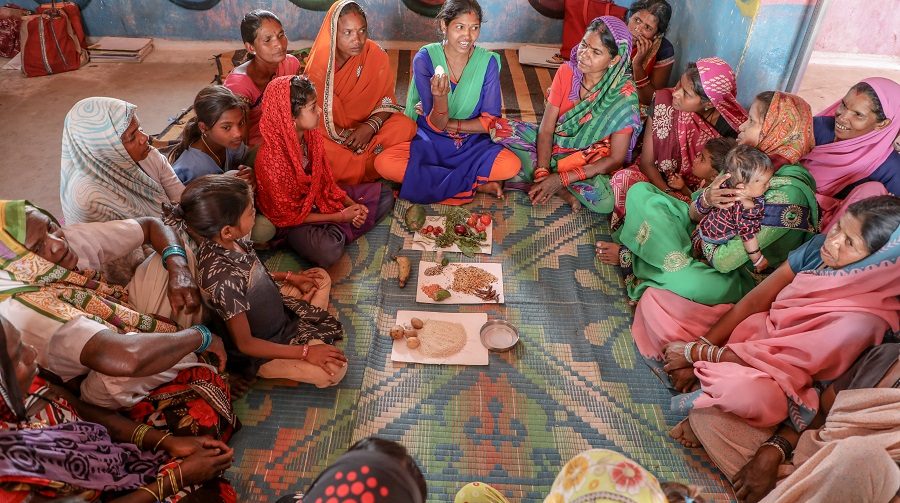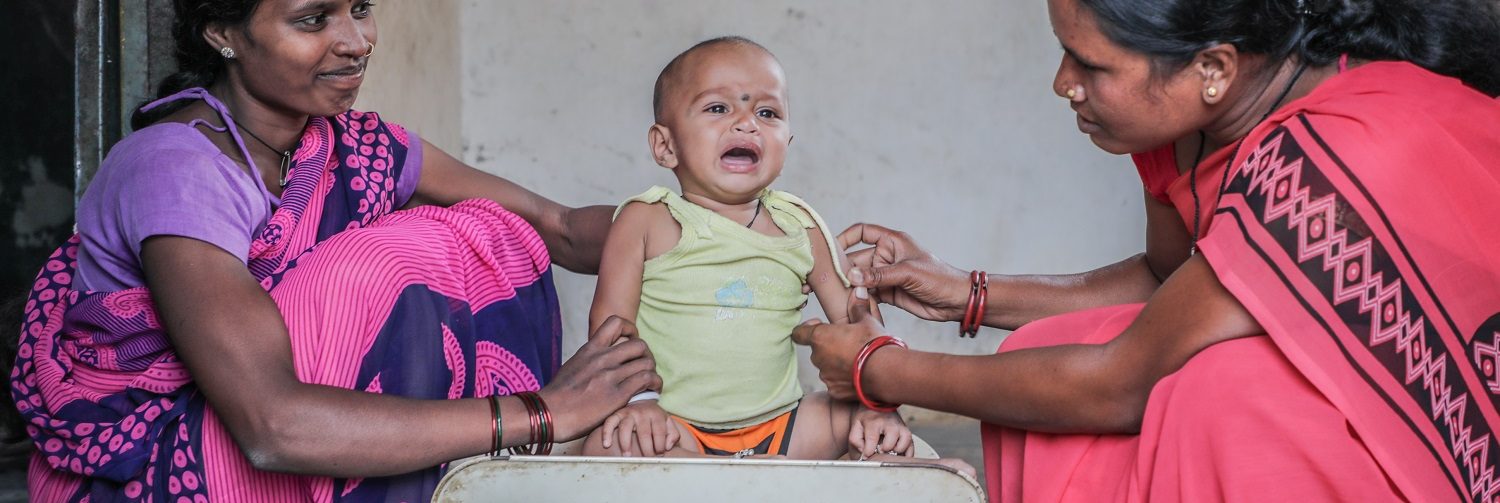At a time when physical movements are limited due to COVID-19 pandemic, the nutrition community in India joined in a virtual event on March 31, 2020, to discuss the evidence base for community-based maternal nutrition programs that include hot-cooked meals for pregnant and lactating women. The event, titled “Improving maternal nutrition: A review of evidence on the One-Full Meal program” was co-hosted by the ICMR-National Institute of Nutrition (NIN), Hyderabad, Institute of Economic Growth (IEG), International Food Policy Research Institute (IFPRI), and UNICEF.
The significance of maternal nutrition, especially during pregnancy, cannot be overstated, both for fetal growth and the mother’s own health. The World Health Organization recommends balanced energy and protein dietary supplementation for pregnant women in undernourished populations to reduce the risk of stillbirths and small for gestational age newborn babies. The One-Full Meal (OFM) program is one such modality to provide balanced food-based dietary supplements to pregnant women and lactating mothers. The OFM program, which is implemented through the Integrated Child Development Services (ICDS) scheme, bundles centre-based hot-cooked meals with other nutrition services and behaviour change communication targeted at improving maternal nutrition and health. It is being implemented in a few states of India, including Andhra Pradesh, Chhattisgarh, Gujarat, Karnataka, Maharashtra and Telangana. In Madhya Pradesh and Uttar Pradesh, it was implemented for a brief period between 2015 and 2017, and subsequently discontinued.
Why focus on this community-based program?
Although the OFM program has been implemented for nearly seven years in different states, there is limited research on its effectiveness, vis-à-vis the stated objectives. First, the program has a varied range of stated objectives aimed at improving biological outcomes, coverage of interventions, and changing health behaviors. Second, it is not known whether, or how much, this programmatic approach might deliver an added benefit over and above the existing programs for improving maternal nutrition outcomes. Third, it is not known whether, or by how much, the coverage of health services has changed through this approach and if there are any additional positive spill-over effects, including enhanced social capital for women and their mental wellbeing. Finally, and most importantly, in the current context of rising overweight and obesity among women, no study has yet assessed the suitability of the standard caloric content of the OFM for pregnant women. With a range of “unknowns”, therefore, it is essential for the nutrition community in India to examine the available evidence on the OFM program systematically to understand its effectiveness.
The virtual convening on 31 March, engaged 65 participants around a discussion on the impact pathways of the OFM program. It helped to identify ongoing, and yet-to-be published, research on the program, and helped to develop consensus on the gaps in knowledge and key questions for an implementation research agenda.
An overview of the program model and potential pathways of impact
The event began with a presentation of an overview of the program, based on a desk review conducted by IFPRI and UNICEF. The overview included a description of various state models, the program impact pathways, and the available published evidence on the program. As part of the presentation, Dr Rasmi Avula from IFPRI described the three program impact pathways – the food pathway, the health interventions pathway, and the group-based behaviour change pathway – developed using the available program documentation. She, however, emphasized that from the existing studies, evidence was only available on the food pathway - “There is very little evidence on the health interventions pathway, and none on the group-based behaviour change pathway or the cross-cutting social capital pathway”. She added, “It will be useful to know more about the contexts in which this program might deliver added benefit over the existing approaches for improving maternal nutrition outcomes, such as the Take-Home Ration and the maternity benefits cash transfer programs, like the Pradhan Mantri Matru Vandana Yojana.”
Examining the evidence gap
In an engaging panel discussion, the panellists deliberated on various aspects of the program impact pathways, the quality of the available research and the gaps in evidence. Reflecting on a quasi-experimental evaluation of the program conducted in Andhra Pradesh, Dr Avula Laxmaiah from NIN said, “Since the program was implemented mostly in poor and tribal areas, the evaluation study design had some drawbacks due to mismatch between program and non-program areas. Now when we conduct the evaluation again, we’ll plan a well-designed impact evaluation study.” He also suggested conducting a special analysis using the existing evaluation data available at NIN to draw additional meaningful inference.
Talking about the study that was conducted on the Mahtari Jatan Yojana, the program model implemented in Chhattisgarh, Dr William Joe from IEG, mentioned that their study looked primarily at the food pathway. He mentioned that overall the program uptake in Chhattisgarh was high and strong equity effects were noted. However, the program had limited focus on the urban areas. Since it was a cross-sectional study, seasonal variability could not be explored. Discussing some research gaps, Dr Joe said, “We need to explore how this program can be further strengthened as a convergence platform”. He also noted that additional research is needed to understand how other services offered at anganwadi centres, like counselling and early childhood development (ECD), are getting affected.
Providing a brief background on the origins of the program, Dr Vani Sethi from UNICEF, said, “When this program was initiated, it started in very poor and food insecure areas, as replacement meals for the take-home ration.” It was only after 2017 that components of behavior change and health services were added. Continuous additions were made, but there was limited research after the initial pilot phase. For further strengthening the evidence on the program impact pathways, Dr Sethi suggested, “We need to explore how this scheme can be used as a mitigation or social protection measure in emergency contexts, like drought-induced food crisis or the current COVID-19 pandemic. The gender and mental health pathways also need to be explored.”
Participants enthusiastically contributed to the discussion through a chat window, posting their questions and comments, or directly speaking. The UNICEF state nutrition specialists reflected on the implementation of their state models, shared anecdotal insights on the reach of the program and challenges associated with it. Together, these thoughts further highlighted the need to systematically study more aspects of the OFM program. There was a broad consensus on the insufficient evidence on program’s effectiveness in achieving its stated objectives. This stemmed partly from the limited investments in its full-scale evaluations. There was a strong call to invest in implementation research on the OFM program and not just its impact on the biological outcomes. Finally, it was noted that it would be useful to understand the reasons for the program’s continuation/discontinuation in certain states and the financing models.
The way forward
Reflecting on the discussions in her closing remarks, Dr Purnima Menon from IFPRI, acknowledged that currently we are operating with limited available evidence, which may not be of the best quality. “She noted that implementation research on the program also needed to consider the spill-over effects, both positive (in terms of diets, social capital and other outcomes) and negative (compromise in counselling and ECD services) and look at the range of impacts. Highlighting the importance of learning partnerships, Dr Menon said that as these programs evolve, embedding learning partnerships in the initial stages of program design would be helpful in building the implementation evidence base.
Moving forward, these discussions will be consolidated, and the impact pathways will be updated. A research note will be prepared updating the evidence review and a call for evidence will be noted in it. Stay tuned!
Please find here the presentation of an overview of the One-Full Meal program and potential pathways of impact, made at the event.



